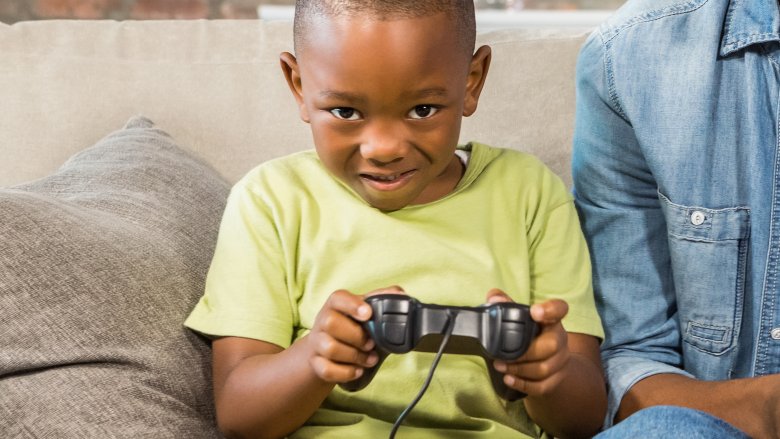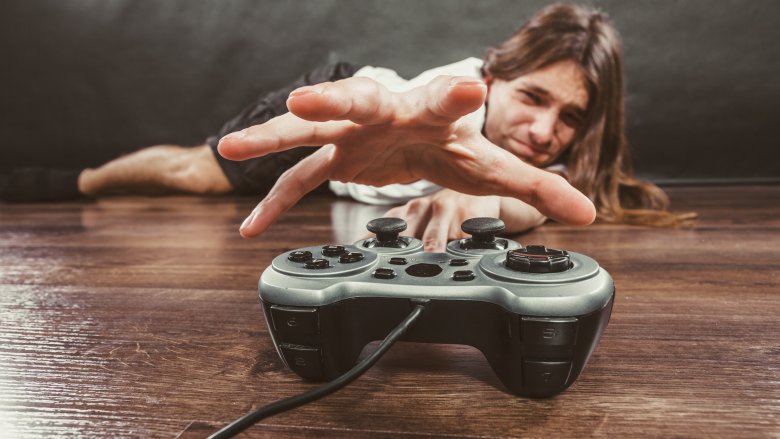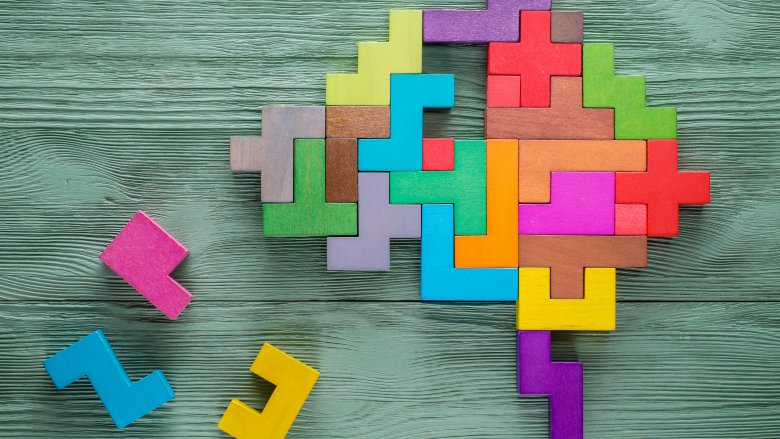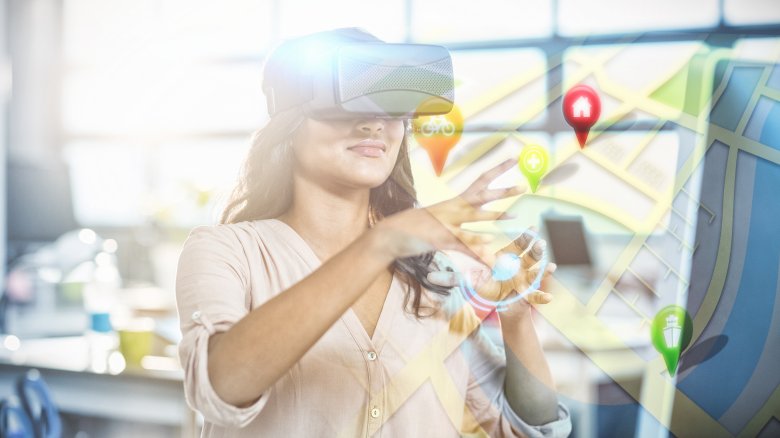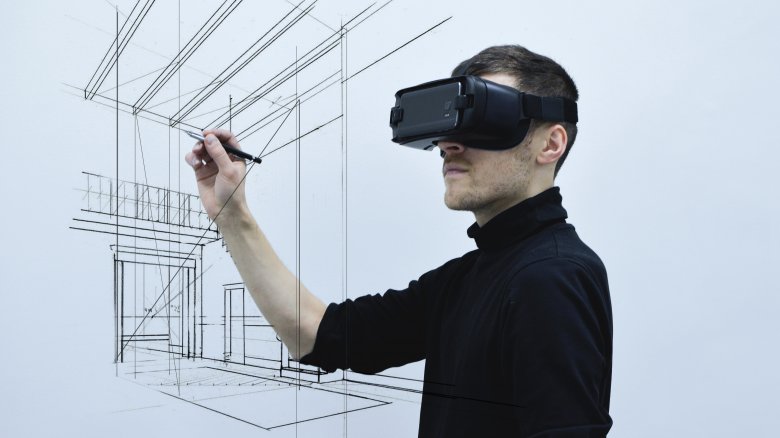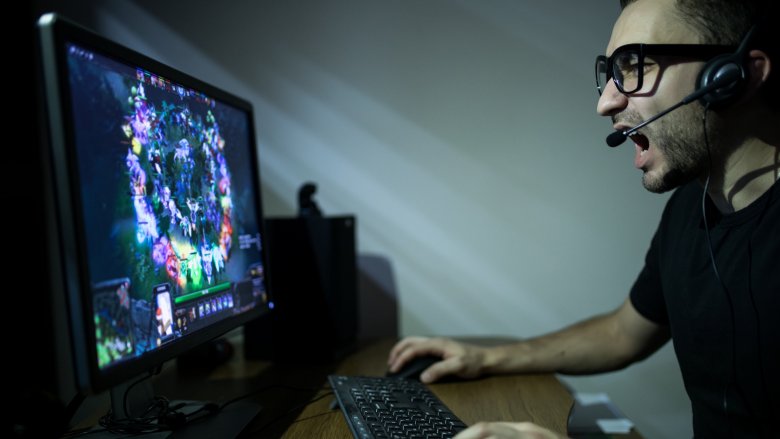Ways Playing Video Games Is Really Good For You
If you're a gamer and you've ever tried to explain how to spend your free time to a family member, friend, or coworker who's not a gamer, you know the typical response. That blank, uncomprehending stare, the look that says they had no idea you had such immature tastes, the suggestion you're wasting hours of your life. Actually, you might not be wasting hours at all — you might actually be making yourself a better person by gaming. Here's how.
It can help in the fight against depression and anxiety
An extensive 2013 study (via Scientific American) found one in six American adults were taking some kind of psychiatric drug. Most were for things like anxiety and depression, which says a lot about the world we live in. If you suffer from either, there's something else that might help: gaming. Slate took a look at the work of psychologist Brian Sutton-Smith, who suggested work isn't the opposite of play, depression is. Someone who's depressed probably cites things like a lack of motivation as one of the biggest challenges, and picking up your favorite game is the perfect way to get motivated to do something, whether it's solve puzzles, get to the next level, or save Tamriel from the evil grip of Molag Bal.
Studies at Stanford University have proven there's something amazing going on in the brain when we start playing. Games stimulate the areas associated with motivation, reward, and learning. In-game success makes the reward centers in the brain feel all warm and fuzzy, while depression does the exact opposite. Playing video games literally repairs the damage done by depression, and learning to face real-life obstacles in the same way you face virtual ones might just make you better equipped to deal with all the garbage life throws at you.
There are also video games that have been developed around various mental illnesses, like Zoe Quinn's Depression Quest. You can never have too much awareness of issues like this.
Co-op gameplay makes people more helpful
If you cringe every time a coworker approaches you looking for help ("Ugh, incompetence. Why is everyone else so lazy?"), you should probably spend some time playing a video game that requires cooperative collaboration for anyone to be successful. It might make you less cranky, which everyone will appreciate.
Texas Tech University professor John Velez took a look at how in-game cooperation impacted real world helpfulness. In one experiment, participants were tasked with playing either co-op Time Splitters or solo Halo: Reach, then were asked whether or not they wanted to hand out some real-life aggression by making someone else listen to a loud, obnoxious sound. Playing a violent first-person shooter game like Halo didn't increase a person's violent tendencies, and co-op play lessened them.
Velez says the results were notable enough that they absolutely need to be taken into account when people start condemning violent video games as encouraging aggression, especially when co-op play is involved. People seem to become more focused on helping others and more aware of the social aspect of the world — virtual or real — around them. Velez got the same results when participants played a nonviolent sports game. Hey, it's a great reason to ask the boss for a Call of Duty team-building session.
Tetris has been found to help with PTSD
We tend to think of PTSD as mostly connected to the military and combat veterans, but according to the U.K.'s National Health Service, it can be triggered by any stressful event. That includes things like natural disasters, the unexpected death of a family member, or a personal assault. The NHS and the University of Oxford published a paper on PTSD in Molecular Psychiatry in 2017, but instead of looking for a cure or treatment, they were looking at prevention.
The experiment was based on the idea of "Tetris-based intervention." People who were waiting in an emergency room after being involved in or witnessing a car accident were given Tetris to play, while others were given a written exercise. They were then instructed to record the instances of traumatic memories surfacing over the following days; those that played Tetris had significantly fewer bad episodes.
The findings build on earlier studies, according to ArsTechnica. Playing Tetris in that vital six-hour window where traumatic memories form appeared to disrupt those memories, keeping them from taking shapes that will haunt us later. They call it a sort of "cognitive vaccine," and it makes that catchy Russian tune more powerful than you thought. It turns out, it can even keep nightmares and demons at bay.
They can help us deal with criticism better
Hate it when people tell you how terrible you are? Invest in a game, and you might just be able to start dealing with criticism better.
Texas Tech's John Velez looked at whether or not gamers were able to transfer the feelings of in-game successes and worth to the real world, and found they were. Velez found that students who scored poorly on a test were more likely to pick themselves up, dust themselves off, and double down for the next test if they were gamers who placed a definite value on in-game successes. He said video games reaffirmed the self-worth of gamers and made them realize they could succeed, and that they were better at picking out what they needed to improve on to get where they needed to be. The crucial element was that people needed to place value on gaming and see it as a part of their identity for it to work. Those that did were less defensive when they received real-world negative feedback. Let's face it, we could all use a little positive reinforcement in our lives.
They make you more efficient at multitasking
We're not going to get into the discussion on whether multitasking is good or bad, but we will say that in our modern world, it's an inevitable necessity. According to a partnership between the universities of Geneva, Wisconsin at Madison, and Rochester, people who play action or first-person shooter games are better at multitasking. They're able to pay attention to more things at once, and they're able to perform multiple tasks simultaneously with less of a negative impact on their performance. So far, that's even proven to be the case when you're talking about using different types of media at the same time, like reading emails while watching a video presentation.
Other studies have shown gamers are better at different sorts of dual activities, too. For example, gamers performed better on tests that required them to categorize numbers in two different ways — odd or even, and greater or less than 5. Non-gamers who underwent some game training showed improvements in their abilities, and while there's a ton we still don't know about this sort of cause-and-effect, we do know that not all games are created equal. If you want to improve your multitasking abilities, you're going to have to break out some action games. You can thank us for that little tidbit when you're done playing.
It can improve your spatial awareness and navigational abilities
Have you ever spent so much time playing a game that you dream about it? You dream you're wandering through levels, going from one city to the next, or navigating streets. It turns out video games actually do something fascinating with your brain, and a joint venture by Harvard Medical School, Boston University, and the University of Chile found games can help develop a person's sense of spatial awareness and their ability to navigate. They discovered this in the most awesome way possible — by testing it on the blind.
After playing an audio-based environmental simulator developed for the study and using it to explore a virtual world, participants were then asked to perform a series of real-world navigational tasks. The more successful they were in the virtual world, the more successful they were in the real one. By training in a gaming simulator that mimicked things like distance cues, echoes, and sounds (as opposed to giving step-by-step directions), people became more adept at interpreting those same cues in a real-world environment.
And that's huge. Not only is a virtual world a safe environment to hone new skills in, researchers think navigating virtual worlds helps us expand the navigational information we're capable of processing in the real world, which can have serious benefits for both the blind and sighted. Sounds more interesting than Google Maps.
Tetris can help you fight cravings
Trying to quit junk food? Smoking? Any other bad habits? Try playing Tetris for only a few minutes, and you'll be better equipped to say no.
In 2015, a study from Plymouth University and the Queensland University of Technology looked at whether playing Tetris could interfere with seemingly impossible-to-resist cravings. It absolutely did. Participants reported their cravings — for things including alcohol, cigarettes, and activities like sleeping and sex. Half of them were instructed to spend just three minutes playing Tetris and then reporting their deepest, darkest desires again. Across the board, Tetris was found to be an undeniably valuable support tool in fighting off those cravings, and the game's effectiveness continued no matter how many times someone played it. Researchers think Tetris might help because it preoccupies your visual and imaginative brain function, essentially distracting you from other wants. So, there you have it — the most valuable app on your phone when you're trying to quit.
It makes you more creative
Creativity is awesome, and that's true from childhood to adulthood. Creative kids have more interesting imaginary friends, and creative adults have more fun. Some are born with creativity, but a study from Michigan State University suggests video games can help foster it.
They looked at a sample group of 12-year-olds along with how often they used four different types of technology — the internet, computers, cell phones, and video games — then tested them to see how that impacted their creative thinking abilities. While parents were surveyed about their child's preferred use of technology (along with what types of video games they played), the kids were given two activities to assess their creativity. That included drawing tasks and one that asked them to imagine scenarios around a given picture. Across the board, kids who played more video games were way more creative when it came to completing tests. It wasn't impacted by their video game of choice, their gender, or their race. No other type of technology had that kind of impact. Perhaps if you want your kids to be creative, go pick up some art supplies, some notebooks, and the latest Super Mario game.
It can improve balance at brain level
You're probably familiar with the idea that video games can improve your hand-eye coordination, and it makes sense. Gamers have been saying it for a long time, and the idea was confirmed by yet another study in 2016. But there's another, less commonly cited area some games can help in: balance.
In 2014, the Multiple Sclerosis Center at Italy's Sapienza University published its findings on a study done to find out whether using a Wii Balance Board had any positive impact on those diagnosed with MS. As you can probably guess, it totally did.
That's a huge deal, because a loss of balance is one of the biggest things MS sufferers have to deal with — not just because of the symptoms, but because it impacts their freedom and independence. For the study, patients spent five 30-minute sessions a week practicing on the Balance Board. Compared to a control group, the Wii surfers reported an improvement in their balance, but they also showed it on their MRIs. Over the course of the 12 weeks, the gamers showed an observable change in the nerves responsible for delivering impulses between the body and the brain. It was more than practice making perfect; it actually appeared to help damaged brain cells. Your parents never suggested that possibility, did they?
It can improve your visual attention
Sometimes, it's tough to justify spending the cash to pick up the latest installment of, say, Resident Evil, so here's one reason. According to the University of Toronto, all that time you spend trying to survive in Raccoon City is actually helping you survive in your real-life city. Gamers — specifically those who play action games — are essentially training their brains to be more attentive to details that might be on the outskirts of a non-gamer's visual register. After playing either an action or a puzzle game, both gamers and non-gamers were tasked with picking a specific object out of a wide visual field. Not only did the action gamers do better, but there were changes in the electrical activity of the brain that suggested they were processing visual information in a completely different way.
The research has practical applications that go way beyond a laboratory setting. Have you ever been driving along and suddenly realized some idiot kid has kicked a ball out into the road, and they're running after it? You know, right where your car is going to be in about 5 seconds? Awareness of that sort of thing is exactly what action games help you with. If that isn't justification for picking up a new title, nothing is.
It can act as a pain reliever
No matter your age, you're probably suffering from some kind of pain. When you're older, there are the chronic aches and pains that remind you another year's gone past without you doing anything with your life, and when you're younger, you have the very, very acute pains associated with being too stupid to know how your brilliant idea is going to end. Fortunately for you, it doesn't even matter if the pain is acute or chronic, being a gamer can still help you deal with it.
Researchers at the American Pain Society (via the Association for Computer Machinery) — which isn't nearly as horror movie-esque as it sounds — reported in 2010 the results of an ongoing study that looked at how a person's pain tolerance changed during gaming sessions. The general principle is that a game engages your brain so thoroughly it doesn't have as much of a chance to feel pain. Yes, it sounds like wishful thinking, but they're finding it's true.
In one study, children between 6 and 10 were tasked with interacting with a virtual world at the same time their pain tolerance levels for ice water were measured. Interacting with a virtual world definitely made them more tolerant to pain. You know, on second thought, that's just as horror movie-esque as it sounds after all.
It improves your contrast sensitivity
Say you're driving along at night, down a back road, through plenty of trees. Suddenly you realize there's a deer standing in those trees by the road, and you have no chance of stopping if she decides to bolt. You grip the steering wheel and pray to whatever deer gods are listening to make her stay on her nice, safe side of the road until you pass. That's the kind of thing spending all those Fallout hours could help you with, according to work done at Princeton University.
It's not just Fallout that could help; you can pick up any action title for long play sessions that have been shown to help improve something called contrast sensitivity. That's essentially our ability to discern thing like facial features in a dark room or deer against a dark forest. Since it's also one of the vision functions that's most likely to degrade with age, you'd better start playing right now.
While the researchers confirmed action gamers saw the biggest benefit here, it's not clear exactly what's going on. They suspect the changes are happening in the brain and the way we process information we receive, not in the eye itself. But that's all right, too — every reason you have for marathon gaming sessions is a good reason.
It can make your brain stronger
Sure, video games can change your brain, but with the right amount and types of games, it can also make it stronger. According to The Huffington Post, a 2013 study found that the "areas in the brain responsible for spatial navigation, memory formation, strategic planning and fine motor skills in the hands" could all be positively impacted by video games. This makes sense, because most video games aren't easy and take some work to master. They also push you to think strategically. (Just try to beat a Metal Gear game by barreling in guns blazing.) Looking beyond just those perks, the study noted there could be great potential in using video games as a form of therapy for patients who suffer from mental disorders, ranging from Alzheimer's to schizophrenia.
"While previous studies have shown differences in brain structure of video gamers, the present study can demonstrate the direct causal link between video gaming and a volumetric brain increase," study leader Simone Kühn said. "This proves that specific brain regions can be trained by means of video games."
Games can make your hand-eye coordination sharper
You have to be fast to be a good gamer, and not surprisingly, those skills can translate out in very positive ways beyond video games. In 2014, Tech Times reported on a study that found playing action video games "regularly helps gamers learn new sensorimotor skills, especially eye and hand coordination." These skills are similar to what it takes to successfully ride a bicycle without falling over, by using your sight and coordinating your muscles to complete a task successfully. Turns out fragging your buddy or pulling off the perfect Hail Mary could go a long way toward honing those skills. Career-wise, the report notes those abilities can come in handy if you want to be surgeon (since you'll certainly need steady hands). So remember that next time you're flying through Halo, you're also prepping for med school.
Games can keep your mind more nimble
Puzzle games make you think, and research shows they can help keep your mind sharp if you play them consistently.
In 2013, The Huffington Post reported on a University of Iowa study of 681 healthy individuals, ages 50 and older. Some of the subjects frequently played a video game designed to improve mental processing, while the others did not. The results? The ones playing the video game were able to slow and delay the typical decline in cognitive speed and abilities by as much as six years. Put simply, playing the right types of video games can help keep your brain in shape.
Here's what one of the study's lead authors had to say about the findings: "We've shown that 10 hours is enough to slow the decline by several years. We saw a range across all our tests from a minimum of a year-and-a-half all the way up to about six-and-a-half years of recovery or improvement. From just 10 to 14 hours of training, that's quite a lot of improvement."
Even if you're not playing this specially designed game, pretty much any video game can help. Jason Allaire, an associate professor in the department of psychology at North Carolina State University in Raleigh, noted most games are complex enough that they'll push your brain and help stimulate those processing centers. So feel free to hook your grandpa up to World of Warcraft. He'll thank you.
